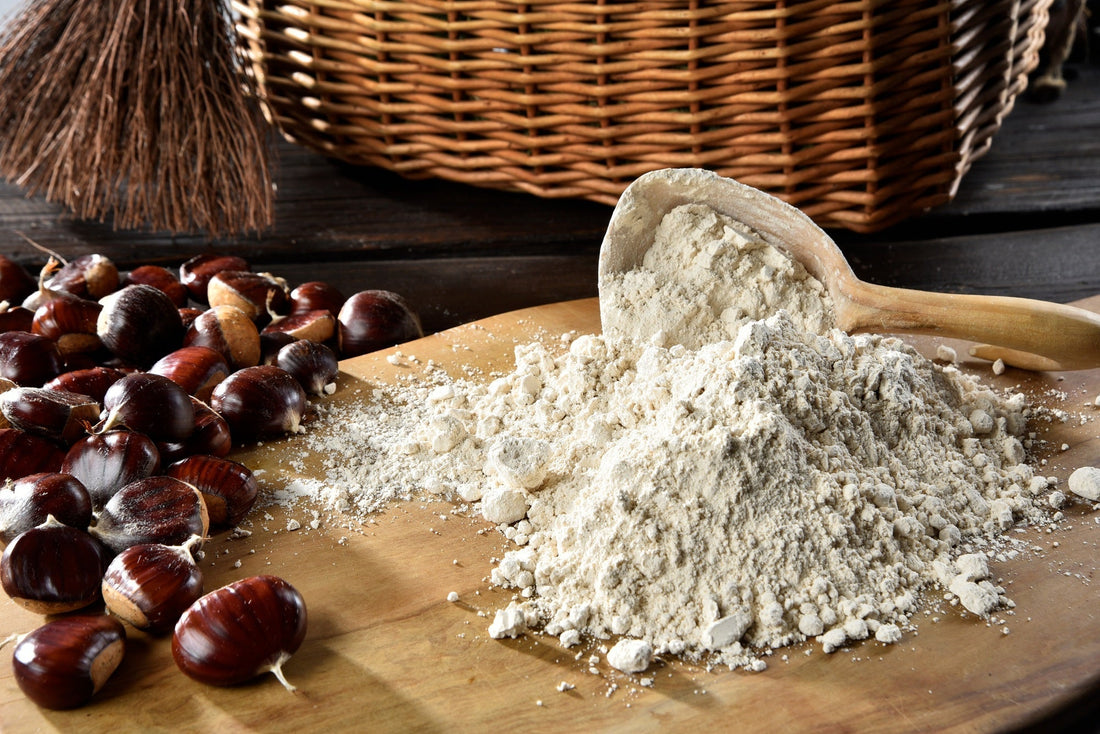Organic Chestnut Flour: A Naturally Sweet, Gluten-Free Superflour

Organic chestnut flour is one of nature’s most underrated treasures a naturally sweet, gluten-free flour that’s both nutritious and versatile. Made by drying and finely grinding organically grown chestnuts, this wholesome flour adds a delicate sweetness and nutty aroma to a wide range of recipes. Whether you’re baking, cooking, or thickening sauces, organic chestnut flour offers a nutrient-dense alternative to refined wheat flours.
What Is Organic Chestnut Flour?
Chestnut flour is produced from pure, dried chestnuts typically from organic orchards where no pesticides or synthetic chemicals are used. Unlike other nut flours, it’s naturally low in fat and rich in complex carbohydrates, giving it a unique lightness. Its mild sweetness and creamy texture make it a favorite in both savory and sweet dishes.
Because of its organic origin, organic chestnut flour retains the chestnut’s full nutritional profile, flavor, and natural color, free from any additives or preservatives.
Nutritional Benefits of Chestnut Flour
Organic chestnut flour isn’t just delicious it’s packed with health benefits that make it a smart choice for everyday cooking.
Rich in Nutrients and Fiber
Chestnuts are an excellent source of dietary fiber, which supports healthy digestion and helps regulate blood sugar. They’re also naturally cholesterol-free and low in fat, unlike other nut-based flours such as almond or hazelnut flour.
Gluten-Free and Allergen-Friendly
For those with gluten sensitivity or celiac disease, organic chestnut flour is an ideal substitute for wheat flour. It’s also nut-allergy friendly since chestnuts are technically seeds, not tree nuts.
Minerals and Vitamins
Chestnut flour provides vitamin C, potassium, magnesium, and iron, offering a subtle nutritional boost. Its slow-release carbohydrates provide sustained energy perfect for athletes or those seeking balanced nutrition.
How to Use Organic Chestnut Flour in Cooking and Baking
The beauty of organic chestnut flour lies in its versatility. It blends effortlessly into both sweet and savory recipes.
Baking Ideas
Use it in muffins, pancakes, waffles, or traditional chestnut cakes. Its natural sweetness means you can reduce added sugar while still achieving a rich, flavorful result.
Try mixing chestnut flour with other gluten-free flours (like rice or oat flour) for better texture and structure.
Savory Dishes
In Italy and France, chestnut flour is a culinary staple used for making gnocchi, crepes, and rustic breads. It’s also excellent for thickening soups, sauces, or even coating vegetables before roasting.
Thickener and Gluten-Free Alternative
Because of its fine texture, organic chestnut flour works beautifully as a thickener for stews and gravies giving a smooth consistency and a mild nutty undertone without overpowering other flavors.
Organic vs. Conventional Chestnut Flour
When you choose certified organic chestnut flour, you ensure your product comes from orchards managed without synthetic fertilizers or pesticides. This protects both the soil and biodiversity.
Conventional flours often undergo chemical processing that strips away natural flavor and nutrients organic versions maintain their full integrity, aroma, and nutrition.
Where to Buy Organic Chestnut Flour
You can find premium-quality organic chestnut flour right here at Organicinbulk.com, your trusted source for certified organic ingredients in bulk quantities.
At Organicinbulk, we focus on sourcing from trusted farms, ensuring that every product is:
- Certified Organic
- Non-GMO
- Sustainably Sourced
- Available in bulk for home or business use
Whether you’re a bakery, restaurant, or health-conscious home cook, you’ll find our organic chestnut flour ideal for your clean-label recipes.
Storage and Shelf Life Tips
To preserve its quality, store chestnut flour in an airtight container away from heat and moisture. It can last for several months in a cool, dry pantry, or even longer when refrigerated or frozen.
Pro tip: Because it’s naturally sweet and absorbent, measure it precisely and avoid overmixing in batters to maintain lightness.
Final Thoughts: A Flour for the Future
Organic chestnut flour isn’t just a trend it’s a return to wholesome, nutrient-rich eating. Its pleasant sweetness, fine texture, and natural health benefits make it a modern favorite for gluten-free baking and plant-based cooking.
By choosing organic, you’re not only nourishing yourself but also supporting sustainable farming practices that protect the planet.
Explore, experiment, and elevate your recipes with the power of nature one scoop of organic chestnut flour at a time.
